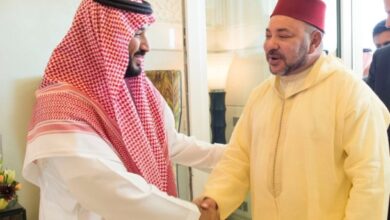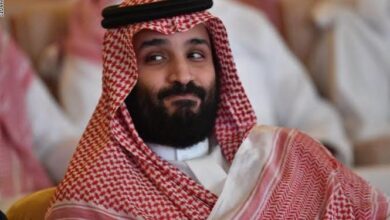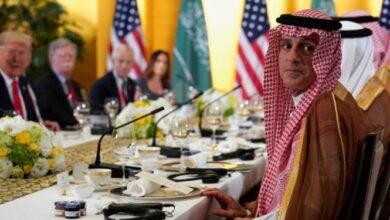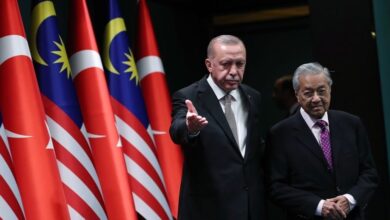Vision 2030 projects are gradually falling
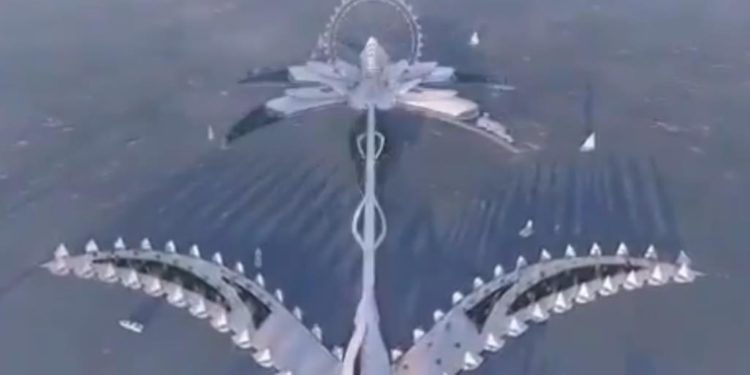
The Vision 2030 projects long promoted by Crown Prince Mohammed bin Salman have turned into a mirage in light of its downfall in light of the unprecedented economic collapse in the Kingdom.
An official in the Saudi regime shirked the “Kingdom Island” project and tried to deny that the project was linked to the Vision 2030, amid questions about whether the suffering of the Kingdom’s economy after the collapse of oil prices and the spread of the Coronavirus is the real reason behind this.
Saudi tweeters posted a video via the hashtag the island of the Kingdom that they said was a huge tourism project of the same name.
According to the video, the project – which was to be built on the coasts of Khobar (east) – consists of three areas, tourism, entertainment, and global, and includes hotels and cinemas, a water games city, a commercial complex, and others.
The video was produced in high technology, and it included the Kingdom Vision 2030 logo and the Eastern Region Municipality logo.
A number of Saudi activists tweeted, in addition to anonymous accounts that are always described as “electronic flies”, welcoming the project and praising the wisdom of officials in the Kingdom, before being surprised by the Saudi News Agency and the Emirate of the Eastern Region.
The official news agency (SPA) published a statement to whom it described as “an official source” – without naming it – saying “a reference to the information circulating about the project called Kingdom of the Kingdom in Al-Khobar Governorate, because the project is not licensed and violates the regulations in the Kingdom, as it has no connection Related projects (with the vision of Saudi Arabia 2030) and is not affiliated with its executive programs or initiatives in any way.”
The source added to the agency, “the promotion of the project using the slogan (Kingdom’s Vision 2030) was without a license or prior permission from the competent authority, and accordingly, regular procedures will be taken.”
For its part, the Emirate of the Eastern Region published a statement on the issue, confirming that “the approval of the Secretariat has not been taken on this project, nor has the mentioned company been granted any official licenses to establish the project…”
This official denial prompted some to say that the difficulties faced by the Saudi economy in recent times may be the real reason behind the retreat from the project and its relevance to Vision 2030.
The CEO of the Saudi Basic Industries Corporation (SABIC) Youssef Al-Bunyan said that the company expects a greater impact on its business due to the Coronavirus pandemic in the second quarter of the year, after incurring losses in the first quarter.
SABIC, the world’s fourth largest petrochemical company, announced a net loss in the first quarter of this year of 950 million riyals ($252.89 million).
A few days ago, Moody’s credit ratings agency revised its outlook for Saudi rating from “stable” to “negative” for the first time in four years.
The agency added that the collapse of oil prices due to the Coronavirus pandemic had increased financial risks to Saudi Arabia, and would erode its sovereign financial reserves.
She said that the severe shock caused by the decline in oil prices will lead to an increase in Saudi debt to about 45% of GDP in the medium term.
Moody’s stated that the expectations indicate a decrease in government revenues for the Kingdom by about 33% during the current year, and by about 25% during the next year, compared to its level in the past year.
For his part, the Minister of Finance in the Saudi regime, Muhammad Al-Jadaan, said that the Kingdom should cut budget spending sharply to counter the impact of the Corona virus.
Al-Jadaan announced that the authorities will take measures “very strict and may be painful,” adding that the withdrawal from the Kingdom’s monetary reserves during the current year should not exceed 120 billion riyals (about 32 billion dollars).
Recently, the British Times newspaper questioned the ability of Muhammad bin Salman to complete his plan to build the city of “Neum” on the Red Sea coast at a cost of five hundred billion dollars in light of many crises, the latest of which was the death of one of its opponents, Abdul Rahim Al-Hwaiti.
The newspaper’s Middle East correspondent, Richard Spencer, shed light at the beginning of his report on the latest crises, which is that Abdul Rahim Al Hwaiti posted videos on the Internet saying that he was among the many people who refused to compromise their property to make way for the NEOM scheme, one of the most prominent projects. Vision 2030” announced by Bin Salman.
In addition, the Coronavirus pandemic has reduced the demand for oil on which the Kingdom depends almost entirely.

